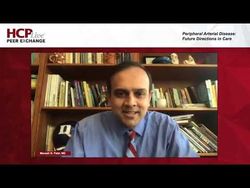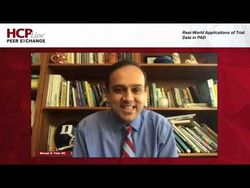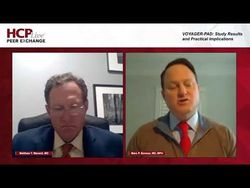Advances in the Management of Peripheral Arterial Disease - Episode 1
COVID-19s Impact on Patients and Care Providers
Transcript: Deepak L. Bhatt, MD, MPH: Hello, and welcome to this HCPLive® Peer Exchange®, “Advances in the Management of Peripheral Arterial Disease.” I am Dr Deepak Bhatt, from Brigham and Women’s Hospital and Harvard Medical School in Boston, Massachusetts. It is really a pleasure for me to introduce some of my great friends to discuss the contemporary management of peripheral artery disease [PAD]. I’m fortunate to be joined by Dr Marc Bonaca of the University of Colorado in Aurora, Colorado; and Dr Michael Gibson and Dr Matthew Menard of Harvard Medical School in Boston, Massachusetts; and Dr Manesh Patel of Duke University in Durham, North Carolina.
Before we get started with what I hope will be an interesting program, it would be colorblind and tone deaf of me not to acknowledge that we are filming this in the middle of an unprecedented pandemic that none of us living has ever experienced. It’s really an incredible human tragedy, but at the same time a remarkable story of people banding together, in particular those of us involved in health care. I would like to get each of you to opine your thoughts about the COVID-19 [coronavirus disease 2019] pandemic and what you personally are doing in your health care system. And then, specific to today’s topic, for those patients with peripheral artery disease—or cardiovascular disease, more broadly—do you have any specific advice that you’re giving your patients? Let me start with you, Mike.
C. Michael Gibson, MD, MS: It’s been a rough time. I think anything we say about the pandemic today may be different tomorrow. Things are changing so quickly. The science is evolving so quickly, so it’s hard to really say much. I will say, personally—as I’ve told you, Deepak—I was out for a month, flat on my back, barely able to walk across the room, short of breath, and I’m still coughing a lot. I had ARDS [acute respiratory distress syndrome] when I was 33. I never got tested because the hospital said it would take 3 weeks for the results to come back at the beginning of the pandemic, and I was told to stay at home. My daughter-in-law has it. I think all of us will have someone who is touched by this disease, and it may touch us personally. I just hope everyone stays healthy and well.
Deepak L. Bhatt, MD, MPH: Thank you so much for joining us. It’s an incredible story with you and your daughter-in-law and your son as well. It shows us that COVID-19 is touching all of us in very personal ways, and I really wish you and your daughter-in-law the best. You mentioned that you had ARDS when you were 33, but now that you’re older, at age 35, it’s a lot harder to recover from those types of illnesses.
C. Michael Gibson, MD, MS : It’s tougher at age 35, yes.
Deepak L. Bhatt, MD, MPH: I wish you the best. Maybe we can see what Marc Bonaca thinks about COVID-19. In particular, what are you doing with your large number of PAD patients?
Marc P. Bonaca, MD, MPH: Thank you, Deepak. I’ll agree that this is an unprecedented time. We hope people are healthy and safe. I think many of the folks in the front line are struggling with how we care for patients. Obviously, our units are filling up with patients with COVID-19. To your point, Deepak, there are a couple of important ramifications. There’s the prothrombotic state associated with COVID-19. I think the risk of thrombotic complications like VTE [venous thromboembolism] and acute limb ischemia—there are some reports on that—is much higher, we’re seeing, in COVID-19—infected patients.
The other issue is that we are trying to keep our patients out of the hospital. We are trying to do everything virtually for our patients with vascular disease. The need to come back for recurrent procedures or other issues is a real problem because we don’t want them to get infected. It’s a very fragile population. We’re trying very proactively to embrace strategies that keep people healthy and away from the hospital because we’re trying to keep people with COVID-19 supported.
Deepak L. Bhatt, MD, MPH: That’s terrific. I’ve got to say, I always think of you as part of the fold and family here. I think I introduced you as being with Harvard Medical School, but of course now you’re at the University of Colorado and running the academic research organization out there, CPC Clinical Research. How are things in Colorado right now with respect to COVID-19?
Marc P. Bonaca, MD, MPH: It’s very much similar to what you’re seeing in Massachusetts. We’re not in a New York situation yet. As Mike said, it’s changing day-to-day, but we’re really increasing in number of cases quite dramatically. Because of the resorts and the travel—although the populations are well up in the mountains—there are very high rates of COVID-19. We expect to see the spike in the middle or the end of April, probably as you’re expecting to. The units are filling up.
Deepak L. Bhatt, MD, MPH: Matt, what are your thoughts on COVID-19? I’ve seen that you’ve still been treating some critical limb ischemia cases in the catheterization laboratories. You’re obviously still busy and taking care of folks. You must, as the vascular surgeon, when emergencies come up. How is all this affecting you, your practice, and your patients?
Matthew T. Menard, MD: Thanks, Deepak. Mike, it’s great to hear of your full recovery from your ordeal. It’s certainly been disruptive, as it has been across all disciplines. We get daily briefings on important triage decisions, and there are certain subgroups of patients that we see—patients on dialysis, but particularly patients with PAD—where the decisions are pretty tough. As Marc mentioned, we’re making a lot of efforts to keep patients out of the hospital. Certainly, all elective and even semielective cases have been canceled. It’s really the most vulnerable, sickest, and critical inpatients for whom time is of the essence. We are still treating those patients as needed, but there are a lot of tough decisions as we try to sort out how to best use our resources. Many of the operating departments have been repurposed for ICU [intensive care unit] care as well. As you said, everyone is pitching in and doing everything they can.
Deepak L. Bhatt, MD, MPH: It’s really wonderful, and you’re doing a great job on the front lines. We were also going to be joined by Dr Manesh Patel, although he got called into the catheterization laboratory at Duke University for an emergency coverage situation. But that’s how unpredictable life is right now for doctors and nurses, where you can get called into action at any moment. Thank you all for your thoughts on COVID-19. It was really valuable for our audience to hear the human side of the toll this is taking.
Transcript Edited for Clarity



